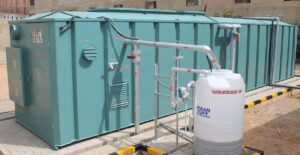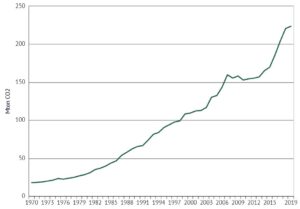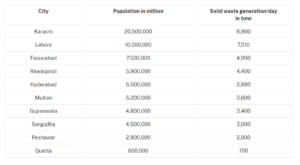
Getz Pharma takes a LEED for Pakistan by preserving and protecting the environment
Pakistan is extremely vulnerable to the adverse effects of climate change, despite contributing less than 1 percent to the world’s greenhouse gases, this is mainly due to its geographical positioning. In the last 50 years, the annual mean temperature in Pakistan has risen by roughly 0.5°C. The number of heatwave days per year has amplified to nearly fivefold in the last 30 years, according to a report published by the Asian Development Bank. Additionally, the Global Climate Risk Index annual report for 2020 suggests, Pakistan has lost 0.53 percent per unit GDP, and witnessed 152 extreme weather events from 1999 to 2018. The industrial sector is the backbone of Pakistan’s economic growth however, it also contributes largely towards carbon emissions. While effective environmental laws exist, there is poor accountability for violations.
Since its inception in 1995, Getz Pharma has always put the preservation of the environment at the forefront of its CSR activities and to date actively promotes green initiatives in its business practices to create a healthy and safe environment for the sake of posterity. “It is important that we as humans keep reminding ourselves that we are not alone on this planet. There is a huge biological ecosystem that exists around us. If we want to live a better and more sustainable life, we need to unlearn and relearn how to honor the cycle of life,” said, Khalid Mahmood, Managing Director & CEO of Getz Pharma, during a recent live show hosted by Getz Pharma, on World Environment Day. Wanting to create a truly green facility, Getz Pharma designed and built its new manufacturing facility, Astola, as per the comprehensive guidelines laid out by U.S. Green Building Council (USGBC) to steer the country towards an environmentally sustainable future. Located in the heart of Karachi’s Korangi Industrial Area, the Astola plant is equipped with state-of-the-art green building features, designed to efficiently reduce carbon emissions, water usage, and energy consumption. Getz Pharma’s compliance with the highest environmental standards has earned its Astola plant the prestigious Leadership in Energy and Environmental Design (LEED) Platinum certification, awarded by U.S. Green Building Council (USGBC). It is worthy to note, that Getz Pharma is the first pharmaceutical company in Pakistan and entire South Asia to receive this esteemed accreditation.
Here’s how Getz Pharma achieved LEED for Pakistan:
Getz Pharma takes a LEED for Pakistan by conserving water for future generations

Pakistan’s industrial sector plays a pivotal role in the economic growth of the country however, a huge amount of municipal and industrial untreated effluents are being deposited into the environment, which can cause waterborne diseases such as hepatitis. Akin to this, researchers carried out a study in which they collected samples from five different drains, each having the combined effluent of many industries. Surprisingly, the majority of the water quality parameters didn’t equate to the National Environmental Quality Standards in the country. To address this, Getz Pharma installed a state-of-the-art effluent treatment plant at the Astola plant, designed to treat liquid effluents and recycle wastewater for non-process purposes such as gardening. Additionally, Getz Pharma has also installed water-efficient fixtures such as self-closing faucets to ensure that less water is wasted during usage. By taking such comprehensive water-conserving measures at the Astola plant, Getz Pharma will reduce potable water consumption by 59%.
Getz Pharma takes a LEED for Pakistan by reducing the carbon footprint for future generations

Carbon emissions per capita of Pakistan increased from 0.31 tons of CO2 per capita in 1970 to 1.09 tons of CO2 per capita in 2019 growing at an average annual rate of 2.72%. Source: Global GHG and CO2 Emissions / Knoema
In 2019, Pakistan’s carbon emissions (CO2) per capita was at 1.09 tons, according to data technology firm, Knoema. At present, the country emits 223.6 million tons of CO2 by burning fossil fuels and industrial purposes. To reduce carbon emissions from its business practices, Getz Pharma has installed the largest state-of-the-art private-sector solar panels at our new manufacturing facility, Astola. These solar panels will help generate up to 466 KW (extendable up to 700 KW) on-site renewable energy and reduce carbon emission by 42%. Additionally, Getz Pharma has planted 7000 indigenous trees and shrubs at the Astola plant to reduce pollution and improve outdoor air quality.
Getz Pharma takes a LEED for Pakistan by reducing industrial waste

Source: International Trade Administration
The Sindh Industrial Trading Estate (S.I.T.E) is the oldest and the largest industrial area of Pakistan. Over the years, migrant workers who are employed in small enterprises and factories have settled down in the nearby vicinity so they could easily commute to work. However, hazardous chemical waste is often dumped on empty land areas, which causes serious health diseases amongst the residents. According to a report published by United Nations, Karachi generates more than 9,000 tons of municipal waste daily. To counter this, Getz Pharma ensured that 84% of its construction wastage was disposed off ecologically to divert a minimum amount of waste to landfills.
Getz Pharma takes a LEED for Pakistan by reducing energy consumption

Pakistan’s energy sector faces a severe power generation crisis; this directly hinders the economic development of the country. According to a report published by Macro Economic Insights, the power crisis has cost the country $82 billion in lost GDP between 2007 and 2020. As a leading pharmaceutical company, Getz Pharma operates a large-scale manufacturing facility, leading to an increased usage of heating and air-conditioning which can consume a significant amount of energy. Hence, Getz Pharma installed energy-efficient equipment such as steam boilers and centralized air-conditioning systems at the Astola plant to reduce energy consumption. Furthermore, while the growing industrial activity only increases the burden on the country’s grid, Getz Pharma has taken a step in the right direction by investing in renewable energy. The new manufacturing facility, Astola, has the largest private-sector solar panels, generating up to 466 KW (extendable up to 700 KW) on-site renewable energy to reduce energy consumption by 42%.
Getz Pharma took a LEED for Pakistan by contributing to the economy by generating employment and maintaining quality standards

An estimated 6.65 million people are unemployed in Pakistan. Getz Pharma, being the largest employer in the pharmaceutical industry, creates numerous direct and indirect employment through its operations. Apart from receiving the prestigious LEED Platinum certification, Getz Pharma is currently the only pharmaceutical company in Pakistan that has World Health Organization (WHO) Pre-qualification and Pharmaceutical Inspection Co-operation Scheme (PIC/S) certification, eliminating dependence on imported medicines by producing International high-quality standard medicines locally. Acknowledging Getz Pharma’s contribution, the Federation of Pakistan Chambers of Commerce and Industry (FPCCI) has been awarding the organization the highest export performance award for the last 14 years.
Getz Pharma is proud to attain the LEED Platinum certification for Pakistan. By achieving this prestigious certification, Getz Pharma is setting precedent for the corporate sector, that economic growth can very well be accomplished alongside preserving and protecting the environment.
When you Care, you LEED!
You are about to be redirected to an online retailer’s website. Getz Pharma is not liable for any data exchange on the new website
You will be redirected in 3secs
Disclaimer: "This message (including attachment) is intended solely for the use of the individual or entity whom it is addressed and may contain information that is confidential or privileged. If you are not the intended recipient of this message, you are hereby notified that any use, dissemination, distribution or reproduction of this message is prohibited and that, you must not take any action in reliance on it. E-mail transmission cannot be guaranteed to be secure or error-free as information could be intercepted, corrupted, lost, destroyed, arrived incomplete or contain viruses; therefore Getz Pharma (Private) Limited cannot accept legal responsibility for the contents of this message. If you have received this communication in error, please notify the sender or Getz Pharma (Private) Limited at [email protected] immediately and destroy the original message."
Close